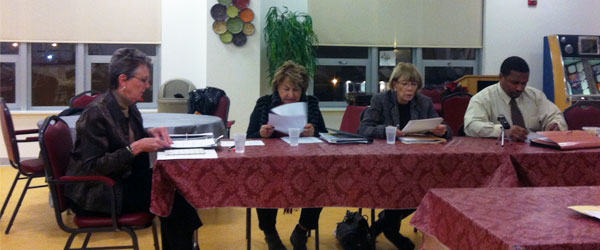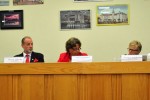Charter Study group interviews Reidy
City debt, infrastructure financing, police dept. oversight addressed
The city’s charter study commission met on Monday, Jan. 29, at the Springwood Center. The group interviewed city manager Terence Reidy as part of their mission to study the city’s form of government. This was the third time Reidy met with the commission.
The commission, which consists of five elected members, is tasked with studying the city’s current form of government, which is a municipal manager form of government. In this form of government, an at-large, nonpartisan election is held for, in Asbury’s case, five council members every four years.
The mayor is elected by the city council and presides over the council. The council exercises legislative and policy power over the municipality, but the city manager is chief executive and administrative official of the municipality.
The commission has nine months to study the city’s form of government and can suggest changes — such as changing to a strong mayor-council form of government or a commission — in a report at the end of their nine months. Depending on the nature of the changes, either a council vote or a vote among city residents may be required.
WATERFRONT INFRASTRUCTURE FINANCING
The meeting began with Reidy questioning commissioner Rita Marano’s connection a letter to the editor that recently appeared in the weekly newspaper “The Coaster.” Marano was listed as an author of the letter.
“In the letter you wrote, you called the infrastructure program a sham, [and said] that we’re giving away tax dollars, that it’s irresponsible, detrimental and unfair to the citizens, and the plan is an insult to the residents,” Reidy said.
Reidy asked Marano to explain her “grounding” for those claims. “What about this plan is irresponsible or a tax burden to the residents?” he said.
Marano said the plan was going to cost taxpayers money, but Reidy countered that it would not. Marano said she had read the entire plan and that she and others felt that the plan would eventually be paid for by Asbury Park tax dollars.
“You’re now an elected official,” Reidy said when Marano asked why he brought up the issue. “What you say carries more weight than before you were an elected commissioner. What you say in public could weigh in on the decision this commission makes. I want you to explain to me why you came up with this.”
“I’m still a taxpayer,” Marano said.
“I’m a taxpayer, too,” Reidy said. “As a public official, you’re held to a higher standard.”
Commissioner Duanne Small said Marano didn’t write the letter as a commission member, but as a taxpayer, adding that the issue “has no relevancy here and we shouldn’t be discussing it.” Commission chair Pam Lamberton said she agreed with Small, but added that Reidy could explain how the infrastructure funding plan works in the context of the city’s form of government.
Reidy explained the waterfront infrastructure funding mechanism. Through a payment in lieu of taxes [PILOT] program, those who buy newly constructed properties in the waterfront redevelopment area will pay the same annual amount to the city as they would in a typical property tax system.
The typical Asbury Park taxpayer pays a portion of their property taxes to the school, the county and the city. Those participating in this PILOT program will pay only 5 percent toward the county, while 40 percent of their annual bill will pay off a bond that’s being taken out to pay for infrastructure repairs. The remaining 55 percent will go into the city’s tax coffers.
The PILOT program has been approved for the next 30 years, Reidy said. The school and county are not necessarily losing money due to this agreement, in his opinion, “because without this development [on the waterfront] there would be nothing.”
Marano said she still felt the city’s property taxpayers would be responsible for paying off the loan that’s being used for the infrastructure repairs.
“The city is not on the hook for one penny,” Reidy said.
CRIME IN THE CITY
Next, Reidy answered a list of questions created by the commissioners. One question involved increased violence in the city. Reidy provided a list of programs the city implements to try and mitigate local crime, including recreation programs like the Police Athletic League [PAL] boxing program, which serves about 10 young people per year in the city’s boxing facility located above the department of public works [DPW] headquarters.
The city may offer those boxing facilities to other municipalities as a way of generating revenue, Reidy added.
SHARED SERVICES
The commission also asked Reidy what he would implement in the city “if politics and funding were immaterial.”
Reidy responded that he’d like to see full employment and training for everyone in the city, as well as family counselling. He recognized this was a “huge order” and also offered a “more moderate answer — regionalizing services.”
This could save money county-wide and provide a higher level of service, Reidy said. But sometimes, a desire for home rule and a fear of the unknown can deter municipalities from pursuing shared services initiatives, he said.
Asbury has already made steps toward regionalizing services, by joining the county’s police dispatch program. Reidy also has tasked Fire and EMS [Emergency Medical Services] chief Kevin Keddy with seeking more shared services options.
ASBURY’S EMPLOYEES
The commission’s next question dealt with how many employees the city has. The city retains 213 full-time employees, Reidy said, although that number is expected to increase in 2013 as more police and fire officers are added to those departments’ ranks.
Almost all city employees are in one union or another, excluding Reidy, executive secretary Cassandra Dickerson, payroll manager Mary Kay Callahan and one or two others, Reidy said.
The city has 82 part-time employees, which includes 27 crossing guards, 24 special police officers, and 21 people who fill professional positions like city attorney, prosecutor, and other positions. The city also has 10 part-time public works employees who are being paid through a grant program.
The “vast majority” of full-time employees and professional part-time employees hold college degrees, Reidy said.
Those applying to be police or fire officers in Asbury Park must live in the city, but are permitted to move out once they are hired, Reidy said. Those running for council must be residents of the city for at least one year, but there is no time requirement for those interested in joining the police or fire departments.
As for the rest of the municipality’s jobs, there is no resident requirement but preference is given to residents, Reidy said. For jobs under the jurisdiction of the Civil Service Commission, that commission provides the city with a list of applicants who live in the city first, “and you’re required to hire from that list first,” Reidy said, although there is no rule against moving out of town once a resident secures a Civil Service job.
Commissioner Michelle Maguire asked Reidy about employees bringing vehicles home with them.
“We’ve cut down a lot on that,” Reidy said. “I don’t have the number of people who take vehicles home, but it’s mostly people who are on call 24/7. It’s not a perk you would normally get.”
FISCAL MONITORS
The next question asked by the commission was, “Does a fiscal monitor have the ability to affect change?”
The state has appointed two fiscal monitors to monitor the city’s finances because Asbury Park receives transitional aid.
Reidy responded that no state-appointed fiscal monitor has ever impeded his ability to effectuate change in the city, and that most monitors “have been a resource.” The presence of a fiscal monitor adds an extra step to approving expenditures, but both of the city’s fiscal monitors are former town or city managers who “bring a lot of experience to the table,” he said.
TAXES AND GRANTS
The commission also asked if taxes would increase, decrease or stabilize in the near future. Reidy responded that taxes would likely increase gradually, but that they may stabilize following new development on Springwood Avenue and in the waterfront and downtown areas.
Reidy also answered questions about the community development block grants [CDBG] the city receives from the U.S. Department of Housing and Urban Development [HUD] each year.
Some municipalities receive CDBG moneys through their county, but Asbury Park receives direct funding because it is a city. Executive secretary Dickerson determines how the funds will be spent each year. This year, the city will likely receive about $400,000, Reidy said.
Many streets on the west side have been paid for with CDBG money, as well as sidewalk re-paving and capital projects. A certain portion of the CDBG pays for administrative costs, specifically part of Dickerson’s salary, “but that’s capped at a certain percentage.”
Lamberton asked how Dickerson’s control of the funds was checked and balanced, since Dickerson herself decides how much of the fund pays for her salary.
“Everything goes to the finance department and it’s audited by HUD,” Reidy said. “That’s the check and balance.”
Reidy pointed out that CDBG funds would work the same way no matter what form of government the city had.
DEBT SERVICE
Lamberton asked what impact the city’s debt has on city finances. She also asked whether Reidy thought debt would increase, stabilize or decrease over the next five years.
“The debt has a benefit,” Reidy said. “Bonding for projects has benefited the city’s grown for certain.”
Borrowing money to complete infrastructure projects on Springwood Avenue and in the downtown is beneficial because those projects make the city more attractive to potential developers, Reidy said.
The city, which has a total worth of $400 million, is not allowed to borrow more than 3.5 percent of that value, Reidy said. Currently, the city is approaching the 1-percent mark.
Marano asked what the city’s debt service is right now, but Reidy said he did not have those numbers in front of him.
FUTURE EXPENDITURES
Lamberton asked if Reidy foresaw any big expenditures in the near future. The city may need to contribute to the planned park on Springwood Avenue, which thus far has relied on grant funding. Also, the city “has needed a fire house forever,” he said. “That building [on Main Street] is in desperate need of replacement.”
DEPARTMENT HEADS
Reidy has a staff meeting every Thursday morning in which he convenes with the city’s various department heads. He holds the meetings on Thursdays so that he can address department heads about concerns that arise at Wednesday night council meetings.
“In 10 years, I’ve gone through a lot of changes in staff and some people have left,” Reidy said. “I think it’s been an improvement. At this point, it’s a very strong management team, as was evidenced during Sandy.”
CITY HALL’S PHONE SYSTEM
Marano asked if Reidy felt the phone system in City Hall was operated fairly. The phones in City Hall have caller identification, which could enable employees to screen calls in case they don’t want to speak to a certain resident, Marano said.
Reidy responded that if this is happening, Marano should tell him which employees she suspects are screening their calls.
“If this is a perceived problem, this is really pertinent to how responsive the city is to its residents,” Lamberton said.
Marano suggested the city establish a procedure for the employees to deal with taxpayers who call City Hall.
POLICE DEPARTMENT OVERSIGHT
The commission asked Reidy about police officers being held accountable for perceived indiscretions. The discussion at times turned to an issue Commissioner Randy Thompson had with the police department.
Thompson asked Reidy how he ensures complaints about officers are properly handled.
“Most of them go to the Prosecutor’s Office and the county does a thorough investigation,” Reidy said. “I don’t see my role as overseeing the Prosecutor’s Office. I don’t think it’s appropriate.”
Reidy did correspond with the Prosecutor’s Office in Thompson’s case, he said. “You came to a council meeting and put it out to the public and said the system wasn’t working, so I thought it was my role to investigate,” he said.
Thompson said a report from the American Civil Liberties Union [ACLU] says the Monmouth County Prosecutor’s Office can refuse to investigate allegations against an officer unless the chargers are criminal.
The police have their own internal affairs department that handles all complaints, Reidy said, and the Prosecutor’s Office “is involved in 99 percent” of those investigations.
Small pointed out that a complaint against an officer is filed with the internal affairs department rather than the police department, meaning police may be treated differently from private citizens when they are accused of assault or any other crime.
“If I come to the window [at the police department] and say a policeman assaulted me and I have a bruise, they’re not going to lock him up,” Small said. “They’re going to investigate first. It’s a double standard. And if you want to go to the Prosecutor’s Office and file a complaint, they’ll refer you back to the agency where it took place.”
The commissioners and Reidy continued to discuss the issue, until Reidy said he would take a look at the law and see which parts of the internal affairs protocol are legally required of the department.
THE CITY’S BIGGEST ISSUE
The commissioners asked Reidy what he sees as the city’s biggest issue.
“The single biggest issue I see in the time I’ve been here is a lack of unity,” he said. “We could spend the whole night talking about our history and all the things that have separated us and caused this balkanization of our city … There’s a certain anarchic quality of Asbury Park. In some respects, it’s part of what we’re known for, this sense of individualization and strong personalities and all that melting pot stuff that happens in Asbury Park.”
Reidy feels the state-founded Community Development Initiative could help with unification. The program has been in existence for a few years, Reidy said. He also thinks the Ministerial Alliance, a group of ministers from Asbury Park and Neptune, could help with this issue.
THE NEXT CHARTER STUDY MEETING
The charter study commission will meet again on Monday, Feb. 4, at 7 p.m. in City Hall council chambers. They are now preparing to interview city council members as well as some city employees and department heads.
————
[Above photo shows [from left] Pam Lamberton, Rita Marano, Michelle Maguire and Duanne Small at work at this week’s meeting in the Springwood Center.]















